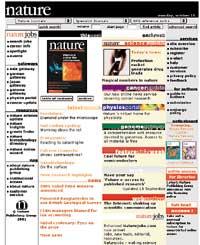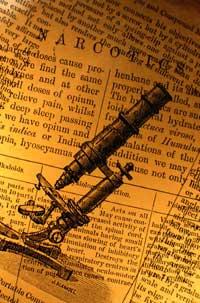Public Library of Science
2001/11/01 Agirre Ruiz de Arkaute, Aitziber - Elhuyar Zientzia Iturria: Elhuyar aldizkaria
Scientific literature from around the world is essential for scientific research to advance. That is why scientists publish the results of their work in specialized journals, although later the copyright of the works are collected by the journals themselves. Therefore, in order to access the results of other researchers, they have to pay expensive subscriptions to these journals.

In recent months a group of researchers has made known the problem of accessibility to information. Scientists have asked whether scientific literature, the only permanent archive of scientific ideas and discoveries largely funded by public money, should be under the control of private properties. Based on this idea, they have opted for the Public Library of Science.
Scientific requirements
This group of researchers has made a clear request that the works found in the network be put free by the journals. To do this, they have sent an open letter to researchers around the world to join their purpose and have already signed 26,000 scientists from 170 countries.
Last year the National Health Institute of the United States (NIH) created the PubMed Central for scientific journals to issue their content. However, at that time it was not very well received, as there were very few magazines that finally participated.
The publishers, in addition to offering the articles for free, must send them to a common space, the PubMed Central. This will facilitate bibliographic searches. According to this group of researchers, it is preferable to look for scientific articles in a single point of reference than to access websites of hundreds of journals.
Library supporters have stated that the project would greatly help science. According to them, the availability and availability of scientific literature would increase considerably; anyone could obtain information anywhere, without limits or prices. This would mean an increase in scientific production and a space conducive to launching works from different scientific communities of thought.
In science, for example, the case of DNA is known. DNA sequences are available at GenBank for anyone who wants it, which has greatly facilitated the work of researchers working on them.
Attitude of journals

For the moment, several prestigious journals have given their approval to the project, such as Proceedings of the National Academy of Sciences, British Medical Journal, Molecular Biology of the Cell, Bioinformatics, Canadian Medical Association Journal, Journal of the American Medical Informatics Association, Genome Hainy and. These journals will be submitted to this library within six months of publication.
The attitude of Science magazine has been different. Although they have been shown in favor of the library, those responsible for the journal have pointed out that any article found in it should refer the reader to the website of the original journal.
The journals Nucleic Acid Research, Genetics, American Journal of Human Genetics and EMBO Journal, as well as those published by the American Association of Microbiology, have taken an intermediate step: at half a year of publication, anyone will be able to access the complete texts free of charge, but these articles will only be available on their websites and will not be sent to the common fund.
However, most journals oppose the Public Library of Science because they want to retain the copyright of their published works. In addition, the director of the European Molecular Biology Organization (EMBO), Frank Gannon, believes that the gratuitousness of his articles would be a great loss of money and it would be very difficult to face the costs of correction and publication of the articles.

In addition, editors have explained other reasons for not doing so, such as losing control of the content of these jobs. They claim that this unlimited distribution is a problem for them, as it is not possible to guarantee the accuracy and integrity of this redistributed material. “The reader could never know if that copied work is accurate,” said the heads of the American Association of Biochemistry and Molecular Biology.
However, several magazines have seen other problems. In his opinion, the proposals of the supporters of the Public Library of Science would leave biomedical publications in the hands of the US government. They point out that this could reduce international recognition.
Boycott
The fact that many magazines have announced their intention not to put their works free of charge, has encouraged supporters of the Public Library of Science to start a boycott against publishers in September. This group of scientists has pointed out that no papers will be published in journals that oppose their intention. But not only that. At the request of these journals will not be judged works of other researchers. In short, to ensure the quality of the papers published, scientists judge each other to decide whether they are fit for publication in the journal.

Without the so-called referee, a system that ensures the quality of the work can be questioned. Instead, the boycott support group has announced its intention to publish scientific papers on its own. To carry out this editorial project it is intended to use private income sources, which for every work published by the scientist would have to pay about 300 dollars.
At the moment, there is the new challenge of scientists. Both groups have assured that they will advance with their purposes, but science can turn upside down if they do not make a joint decision. In fact, we soon began to notice the consequences of this boycott.
Boycott for the globalization of knowledgeWhat is science? What scientists consider science. That is, once strict quality controls have been passed, it is published in specialized magazines. This shows that what the articles say has been worked according to the scientific method. Now scientists, taking advantage of the Internet and the advantages of globalization, which should also be a good thing, want the quality control filter to be in the hands of all that past science. That is why they have proposed the creation of a Public Library of Science. Most specialist magazines did not like the idea. No wonder. Like pink journals, specialized scientific journals are owned by powerful and rich communication groups, Anglo-Saxon in general. These groups, in addition to the strict control of what is published, and therefore of the scientific nature to which it opens and closes, take over the knowledge that accumulates in the journals. Therefore, they appropriate the results of the research that is paid with everyone's money. Faced with the attitude of the journals, scientists have responded with the boycott. More is at stake than it gives at first sight. In fact, fast, free and reliable access to journal archives would imply a new way of researching: science in communication, relationships between scientists and, therefore, in the way of working. The possibilities of simple and powerful research groups would be equated, opening avenues for collaboration and, as can be thought, improving research results. Once and for all, the globalization of knowledge would also benefit the weakest. So be it! Beñardo Kortabarria |

Gai honi buruzko eduki gehiago
Elhuyarrek garatutako teknologia





